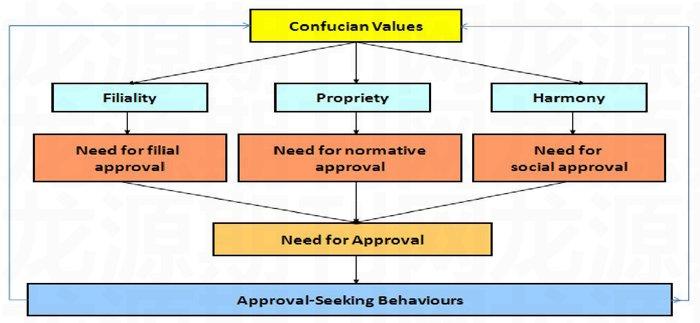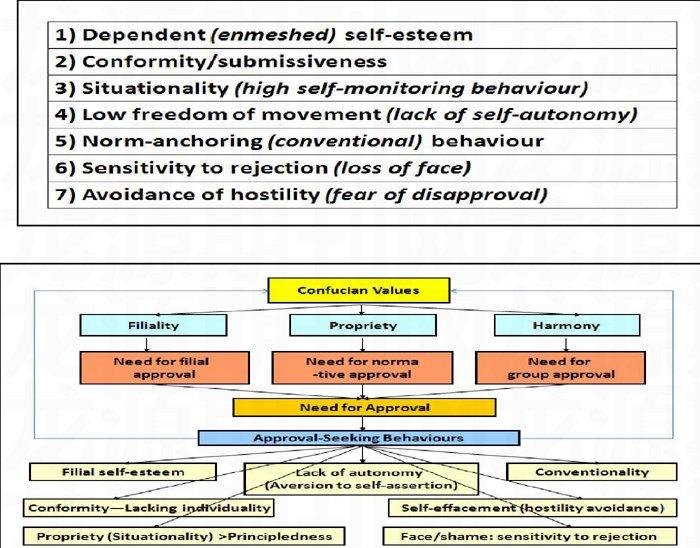孔子与弗洛伊德的文化冲突:为什么我们必须发展华人本土“心理治疗”体系
2009-03-09郑建国
郑建国



虽然孔子与弗洛伊德之间相隔有二千五百多年的时间,但是他们两人同是代表中国和西方文化的巨人。在我们大量向西方学习处理人性问题的当儿,我们须要小心查看他们心理学和心理治疗学对中国文化的合宜性和适用性。因为弗洛伊德是西方心理治疗学的开山祖, 所以由他开始,也是理所当然的。
虽然有关佛教与弗洛伊德的研究已经很多。但是比较孔子与弗洛伊德的研究实在是罕见的。所以我们今天这个‘孔子与弗洛伊德的文化冲突讲座将会把我们带到中国心理学和心理治疗学的最前线。
孔子与弗洛伊德同样承认人的天性是必须受制裁的,但是弗洛伊德认为这些制裁是一种不能避免的祸害。孔子却不同意这想法,认为我们应该利用这些制裁(礼教)发展人性的潜力,达成‘克己复礼为仁的理想。可是,经过二千五百多年的系统性的‘克己中国人的‘自我意识也同时受到了严重的侵蚀。以至‘面具比‘真我,人际比内心的价值更为重要。孔子与弗洛伊德的另一基本分解,就是在‘超我的问题上。虽然超我这观念是弗洛伊德思想体系的基础,可是在儒家的人观上,根本不存在。超我与自我的界限是浑成一片的。
中国人超我的缺失,主要原因是缺乏基督教的罪感。德国社会学家韦伯也认为,因这罪感的缺乏,中国人就没有内在的道德‘杠杆。甚至‘罪这个字也是佛教输入中国后才普偏化的,但是仍然与基督教对罪的意义相差很远。因为从基督教来看,罪不只限于人际上的过错,并包括对神的过犯;不但是一种平面(人人)的道德观念,也同时是一垂直(人神)的道德观念。既然中国人没有‘超我,也缺乏罪感,而超我及罪(疚)感又是弗洛伊德心理治疗的主要解放对象,他究竟能从什么境况把中国人‘解放出来?
除了一个衰萎的自我 (psyche)和缺席的超我 (superego)以外,中国人更有另一文化特征,使我们相当不适宜接受西方心理治疗。那就是我们并没有西方‘笛卡尔文化的人观,把人的灵与体分割开来。这传统对西方文化和心理学都有深远影响。中国人的人观是完整的,整体的。我们用‘身体性病症和词类表达我们的苦恼,也不知如何,用‘心理词类来诉苦的。所以,西方的心理学家和精神病医生很多时叫他们的华人病人‘身体性病人(somatisers),因为他们经常用头痛、腰痛等身体性病症来表达他们内心的哀伤和痛苦。
无论从人性的治理、自我的轻重、道德的分歧和病症的表达不同角度看,西方心理治疗对中国人的相关性和合宜性都提出许多严重的问题。我们现在需要的是,从中国人的观点开创新的途径,发展符合我们文化传统的‘心理治疗体系,充分反映我们儒家社会的伦理和人际倾向,就算完全不提及‘内心的问题也没有问题。
我相信很多中国的心理辅导员已经这样做,我们现在需要做的是发展一套中国心理治疗范式,为辅导员设定理论和实践的标准,让他们可以名正言顺、心安理得地使用本土化方法进行他们的辅导工作。更重要的是,我们若不首先发展一套中国人本土心理学体系,就没可能系统地发展中国人的心理治疗了。
当孔子为国人提倡‘克己复礼为仁的时候,其实他已经播下了中国本土心理学的种子,只是我们到现在才发现到。要使一个人能够达到‘仁的理想,孔子了解到他必须首先在这人心里,自小培养一种强有力的欲望,能使他自动自觉地抑制原本的自私天性。但是那时还没有基督教,也没有佛教,孔子唯一可以做的,就是另找方法。在论语为政篇,我们有证据证明孔子也曾考虑过以法治民的方法 (the rule of law), 但决定那是徒劳而无功的,因为人们可以逃避法律,但仍完全不知耻的: ‘导之以政,齐之以德,民免而无耻。
因此,孔子结果拒绝了法治的方法,而决定推广自己的社会议程,把这种自我控制,抑制天性的欲望放在人们的心里。他了解到若要将这欲望植长于人心里,它必须先将一套认同他人,寻求称许的价值 (approval-inducing values) 如孝道、礼教、和谐等透过父母和师长从小灌输儿童心里。培养他们,不但可以使他们自动自觉地‘克己复礼,想做孝子贤孙,守法市民,争取父母和师长的称许,并且会达成‘为仁的理想。
Cultural Clash—Confucius vs Freud:
• Why We Need to Develop An Indigenous ‘Psychotherapy for the Chinese
• 孔子与弗洛伊德的文化对峙:
为什么我们必须发展华人本土“心理治疗”体系
• Introduction 1
• Even though nearly 2.5 millennia have separated Freud and Confucius, not only are they towering figures that characterise their own culture, they also represent two distinct approachesto the management of human nature.
• At a time when China is looking to the West for answers to our human problems, it is imperative for us to examine the roots of Western psychology, particularly that of Freudian ‘psycho-therapy, and their relevance, appropriateness and applicability to the Chinese people.
• In contrast to the studies on Freudianism and Buddhism, which have been voluminous, those done on Freudianism versus Confucianism have been very rare indeed. For this reason, our seminar today on the cultural clash between Confucius and Freud puts us right at the cutting edge of Chinese psychology and Chinese psychotherapy.
• Introduction 2
• While both Freud and Confucius recognise the need to impose sanctions on human nature, Freud sees any such sanctions only as a necessary evil that is more likely to do harm than good. In contrast, Confucius does not see them as harmful, but a means by which human nature can be harnessed to fulfil its destiny (克己复礼为仁).
• However, as a result of 2500 years of systemic ‘denial of the self (克己), there has also been an erosion of the Chinese awareness of the ‘self. In the process, the importance of the ‘persona (face/role) has overtaken the ‘person (psyche), and the interpersonal has overtaken the intrapersonal.
• Another fundamental difference between Freud and Confucius is that while the ‘superego (超我) plays an integral part in Freuds conception of the human psyche, it does not exist in the Confucian view of man.Instead, it only has the equivalent ofthe ‘reality principle (现实原则)in the form of parental instructions (家教) and prescriptions of the li (礼教).
• Introduction 3
• The absence of the superego in the Chinese is largely due to our lack of a Christian concept of sin, and hence the consciousness of ‘guilt. Even the word ‘sin (罪), which shares the same meaning of ‘crime, was first introduced to China by Buddhism, but that is still far from the Christian notion of sin, which means not only a violation against man, but also that against God: not only a horizontal morality, but also a vertical one.
• As the Chinese do not have a ‘superego—which, for Freud, is a major source of psychological problems, particularly that of ‘repression, the question is: what exactly can Freud ‘liberate the Chinese from?
• Apart from a diminished psyche and the absence of a superego, another cultural trait which has made the Chinese poor candidates for Western psychotherapy is our lack of a Cartesian (dichotomous) view of man--a dualistic split between the mind and the body, which has profoundly influenced Western culture and psychology.
• The Chinese conception of man is a holistic one. We express our distress in bodily symptoms, not psychologicalterms. That is why Western psychologists/psychiatrists often label their Chinese patients ‘somatisers,as they express their psychological problems in somatic complaints such as headaches and backaches.
• Implications to Chinese ‘Psychotherapy
• Whether you look at it from the control of human nature, the status of the psyche, or the way problems are interpreted, there are serious questions about the relevance, appropriateness and applicability of Western psychotherapy to the Chinese people.
• What is needed is for us to develop a completely new approach to psychotherapeutic/counselling interventions from a Chinese perspective. We may even have to change the term from psycho-therapy to something that would accurately reflect our cultural orientation towards the interpersonal rather than the intra-personal, even if we have tothe leave the psyche out altogether.
• I believe that for a lot of Chinese counselling practitioners, this is already happening. However, what we need is to do is to legitimise their practice by developing a new paradigm that would set the basic theoretical parameters for them.
• More importantly, I believe also that we cannot possibly develop a paradigm of Chinese ‘psychotherapy without first developing an indigenous Chinese psychology.
• Unlearning from Western Psychotherapy 1
• First, let us start with ‘psychopathology—what constitutes ‘sick ‘ behaviour. In the West, as independence is of paramount importance to a persons mental well-being, technically all approval-dependent behaviours (including all those in my Chinese samples) can be seen as ‘pathological.
• No Western psychotherapist would encourage their clients to lead a life dependent on the approval of others, but that is exactly what we are supposed to do. The first thing that we have to unlearn from Western psychotherapy is its view that approval-dependent behaviours are necessarily pathological.
• Second, in contrast to an internalised moral paradigm such as the Christian concept of sin and Freuds superego, we Chinese have been relying on an external paradigm--the opinion of others, as our moral gyroscope. The Western obsession of guilt as a major psychological issue is not a Chinese problem.
• Unlearning from Western Psychotherapy 2
• Third, as mentioned before, the term psychotherapy itself is actually a misnomer for the Chinese, since after 2.5 millennia of ‘克己复礼 , the Chinese ‘psyche has become so diminished that most Chinese are no longer even aware of its existence.
• The external character of propriety (礼教 ) that requires only external compliance, but not internal conviction, has also emasculated the ‘person (psyche) in favour of the ‘persona, to such an extent that psychotherapy would be better off changed to ‘persona-therapy— the restoration of ones ‘face (public image) rather than the healing of ones psyche.
• Fourth, from our Western textbooks, we have learnt an entire ‘psychological vocabulary. However, in our counselling practice, we may have to unlearn much of it, so that we could communicate more effectively with our Chinese clients most of whom only talk about their problems in somatic language.
• Psychotherapeutic Strategies for the Chinese
• Do not be afraid to question the cultural validity of Western psycholo-gical or psychotherapeutic systems, no matter how popular they are.
• The need for approval is the key to unlocking most psychosocial problems in China, but it can also cause a lot of problems, when it loses its original purpose of ‘仁. To prevent that from happening in a culture without an internalised arbiter (superego) such as a sense of sin, there is a need for religion to provide that moral sensor.
• Contrary to teachings in Western psychology, Chinese self-esteem is almost always enmeshed, particularly with that of the parents. A lot of psychological/behavioural problems stem from such enmeshment.
• We need to develop a strategy for somatisers, who represent most of our Chinese clients. I suggest nutritional intervention as part of this strategy, as there is strong evidence linking it to mental-well being.
• We need to use epigrams more widely in counselling: epigrammatic thinking is a prominent cognitive style of the Chinese.
• We also need to do much more research into the built-in psychother-peutic elements in traditional customs and ancient rituals, (e.g.求签)
• Conclusion
• The Confucian social agenda has served the Chinese people well for 2.5 millennia by fostering in them a strong need for approval, and would continue to do so for a long time to come.
• However, China is rapidly changing from an agrarian society into a modern, industrialised nation. Our traditional values are threaten-ed by global changes and Western influences. The ‘dammed up libido is about to burst its banks.
• Mental illness is going to be an enormous problem. Unfortunately, we cannot solve the problem simply by importing more Western ideas. As we have shown in this seminar, the cultural chasm between Confucian China and Freudian West cannot be bridged by new theories and therapies from the West. There is no short-cut.
• We must develop an indigenous paradigm of Chinese psychology and ‘psychotherapy ourselves.As a 5000 year old civilisation, we have enough wisdom to solve our own problems, but we need to start with ourselves. We need to understand that even though we are driven by the need for approval, we must not be enslaved to it.
• I believe that when we lose sight of为仁 as our goal in life, we may be already at risk of becoming merely a slave to our own need for approval. Thank you.
